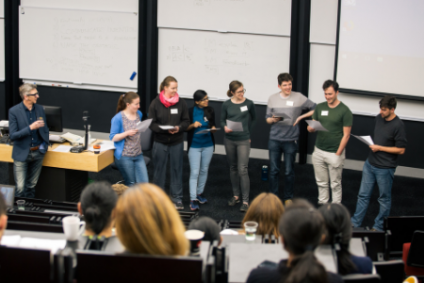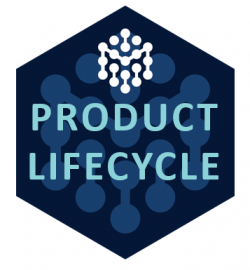Career and Relevant-to-Industry Skills Programme (CRISP)
Building career skills during your research at the MacDiarmid Institute
The Career and Relevant-to-Industry Skills Programme (CRISP) introduces skills to support the success of MacDiarmid Institute members in their future careers – whatever that career may be. Developed for PhD students (but open to Masters students and Postdocs), CRISP explores and develops a diverse range of non-academic skills that is relevant to a range of employment settings, from start-ups to industrial R&D, and from public institutions to professional services companies. Many of these skills are also useful in academia. We anticipate that future employers will recognise CRISP as a valuable addition to your CV.
Key points:
- CRISP is an extracurricular programme, in parallel to your PhD research, taking up a maximum of 12 days over a 2-year period.
- The programme is opt-in and modular. Topics can be selected based on your interests, career aspirations, or out of curiosity. They will be offered in a 2-year rolling cycle.
- The topics on offer have been identified based on their relevance to potential employers.
- High-quality, focused and stimulating training sessions will be delivered by a range of experts.
- Attendance at CRISP will be funded and fully supported by the MacDiarmid Institute.
Upcoming Modules
The next set of workshops will take place in-person alongside the MacDiarmid Institute Annual Symposium in Wellington, and will be held on 19th and 20th November 2024. The topics for these modules are:
- Sustainability of Products, Process and Business Models through Advanced Materials (Tuesday 19th November)
- Tiriti o Waitangi Training Workshop (Wednesday 20th November)
- An Introduction to Investment and Funding Dynamics (Wednesday 20th November)
How it Works

Example of a virtual ‘badge’ for CRISP
Participants in CRISP will earn a virtual ‘badge’ for participation in each opt-in module, distributed via the global Badgr platform. These badges can be attached to your LinkedIn profile, and the MacDiarmid Institute will record and attest to the badges obtained by each student. There will be approximately 15 modules on offer in total over a 2-year period, and the more the merrier when it comes to badges! There is no target to complete the CRISP programme due to potential constraints on capacity. There will be no formal assessment, and badges do not constitute formal qualifications.
Modules will be delivered as face-to-face (where possible) in clusters e.g. 2-3 modules may be available over a 2-day period in one location. Each module will typically take half a day or a full day, and some may be delivered in parallel. A small amount of preparatory and follow-up material may be delivered online.
The modules offered will develop skills that are broadly relevant to many career choices (not just commercial and industry careers). They have been selected through analysis of our alumni data, as well as feedback from a range of potential employers of materials science graduates. We have consulted with start-ups, multinational R&D intensive companies, investors, professional services companies, and government agencies.
Workshops will be interactive, allowing participants to develop an understanding of how to apply new skills to their own areas of research, or enable them to bridge between their scientific discipline and a related field.
Eligibility and selection
Any member of the Institute who is a Masters or PhD student, or a Postdoc is eligible to participate.
When applications to attend exceed the capacity of a CRISP module, places will be allocated based on (in priority order):
- Filling in the application form properly, including a good response to the request for 100-word motivation statements
- Membership of the MESA Executive or Discovery Alumni groups
- Those whose travel costs are relatively low (especially, those living in the hosting city)
- PhD Students (CRISP is primarily targeted at PhD level)
- First-come-first-served
Some decisions on marginal cases may come down to the combination of modules selected, in order to ensure the greatest overall participation rates.
To get involved
Familiarise yourself with the information here, keep an eye on communications from the Institute (e.g. through our weekly Update, newsletters, social media and/or MESA communications) and bookmark this webpage.

Content
You are encouraged to select as many module options as you are interested in within a 2-year period. It does not matter when you start this 2-year period: topics will roll over on a continuing basis. Mix and match the skills in a way that supports your career aspirations, or to explore things you don’t know about.
Programme scheduling will be flexible - information for future workshops will be released at the same time as the call for applications. The general scope of the CRISP programme is indicated by the previous modules listed below (for further progress, see the FAQs and more information document).
Previous Modules:
March 2022
Investment Dynamics for science-based start-up
(17 March 2022), was delivered by Bridgewest Ventures.
Sustainability of products, processes and business models through advanced materials
(24 March 2022), was delivered by the Sustainable Business Network.
June 2022
The Friendly TTO (Technology Transfer Office)
(30 June 2022), was delivered by representatives from Technology Transfer Offices across the Institute’s network.
Developing Healthy Habits for Resilience and Wellbeing in the Workplace
(7 July 2022), was delivered by Julene Hope of Bright Spot Consulting.
November 2022
Creating Personal Impact in the Workplace
(30 November 2022) was delivered by professional facilitators Lisa Allen and Lucy Fookes.
Project Management Skills for Your Future Career
(30 November 2022) was delivered by three professional New Zealand-based project managers.
June 2023
How to Budget and Spend for Research Success
(27 June 2023) was delivered by professional facilitators Lisa Allen and Lucy Fookes.
Building your Personal Effectiveness
(28 June 2023) was delivered by Rachel King, an effective NZ-based facilitator from PEP Worldwide.
Deep Tech Hackathon
(28 June 2023) was delivered by Ben Reid and companies: Marama Labs, Aspiring Materials, Precision Chroma and Bio Valeo.
The Product Development Lifecycle
(29 June 2023) was delivered by senior research leaders from large corporate and small start-up companies, including MacDiarmid alumni and those that have partnered with NZ scientific institutes for product development.
December 2023
Landing Your First High-Impact Job
(6 December 2023) was delivered by representatives from the University of Canterbury, Hays Recruitment and representatives from the Ministry for the Environment, with assistance from a range companies who volunteered their time to help the attendees practise their interview techniques.
Technology-Market Fit
(6 December 2023) was delivered by local entrepreneurs and investors, as well as representatives from Tech Transfer Offices.
Tiriti o Waitangi Training
(8 December 2023) was facilitated by Kūwaha Limited.
April 2024
Inside Government: Lifting the lid on how government works, where science fits in and where a career in government could take you
(4 April 2024) was delivered by Dr Benji Moorhouse, Dr George Slim and Nardine Sleeman and featured contributions from a number of alumni and other scientists working in government.
Working with your Technology Transfer Office on Intellectual Property Arising from Materials Research
(4 April 2024) was delivered by Michael Love, Commercialisation Advisor at the University of Canterbury.
Sessions will recommence in a rolling 2-year cycle.
Frequently Asked Questions (FAQs) and more information:
Downloadable as a PDF here.
For any further information or questions about any upcoming sessions, please contact contact us at MI-CRISP@vuw.ac.nz


